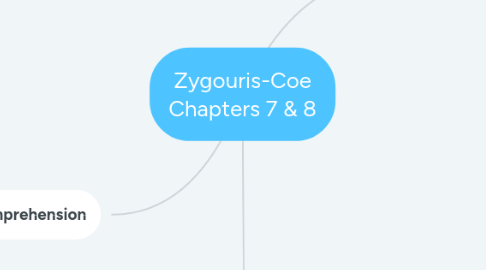
1. Teaching Comprehension
1.1. Strategy Instruction
1.1.1. strategies
1.1.1.1. reciprocal teaching
1.1.1.2. transitional strategies
1.1.1.3. collaborative strategic reading
1.1.2. mental processes
1.2. Content Instruction
1.2.1. building mental representation
1.2.2. text ideas
1.3. Collaborative Inquiry
1.3.1. deepens students understanding of concepts
1.3.2. socializes intelligence
1.3.3. promotes evidence-based explanations
1.3.4. students get into groups to learn by reading, writing, conversing, and thinking
1.3.5. develops critical thinking, social skills, and academic language
1.3.6. Cooperative Learning
2. Fluency and Comprehension
2.1. Fluency
2.1.1. accuracy
2.1.2. automaticity
2.1.2.1. the ability to recognize words quickly without making a concerted effort
2.1.3. components of fluency
2.1.3.1. rate
2.1.3.2. accuracy
2.1.3.3. prosody
2.1.3.3.1. intonation
2.1.3.3.2. expression
2.1.3.3.3. phrasing
2.1.4. Independent Reading
2.1.4.1. read a wide variety of quality texts to build fluency and confidence
2.2. Comprehension
2.2.1. decoding
2.2.2. vocabulary
2.2.3. text structure
2.2.3.1. syntactic structure
2.2.3.2. structure of information
2.2.4. types of text
2.2.4.1. discipline-specific
2.2.4.1.1. discourse
2.2.4.1.2. habits of mind
2.2.4.2. expository
2.2.4.2.1. organizational and graphic aids
2.2.4.3. informational
2.2.4.3.1. hierarchy of ideas
2.2.4.4. narrative
2.2.4.4.1. "story grammar"
3. Academic Language
3.1. "language used by teachers and students for the purpose of acquiring new knowledge and skills...imparting information, describing abstract ideas and developing students' conceptual understandings" (288)
3.2. Students must use academic language to converse, analyze, justify, listen, and interact with each other.
3.2.1. develops ability and proficiency in disciplinary habits of mind
3.3. Teacher must involve and interact with students using academic language for deep thinking to occur.
3.3.1. teacher needs to model use of academic discourse for students
3.4. Social Science
3.4.1. read, analyze, discuss, and write about historical documents and text
3.4.2. author(s)
3.4.2.1. bias
3.4.3. interpretation, investigation, and classification
3.5. Accountable Talk
3.5.1. the ability to verbalize and explain one's own thinking
3.5.2. both the teacher and students are responsible for constructing and negotiating meaning
3.5.3. students need to be attentive, ask questions, participate and engage with the lesson and each other
3.5.3.1. promotes quality thinking/reasoning and discussion

